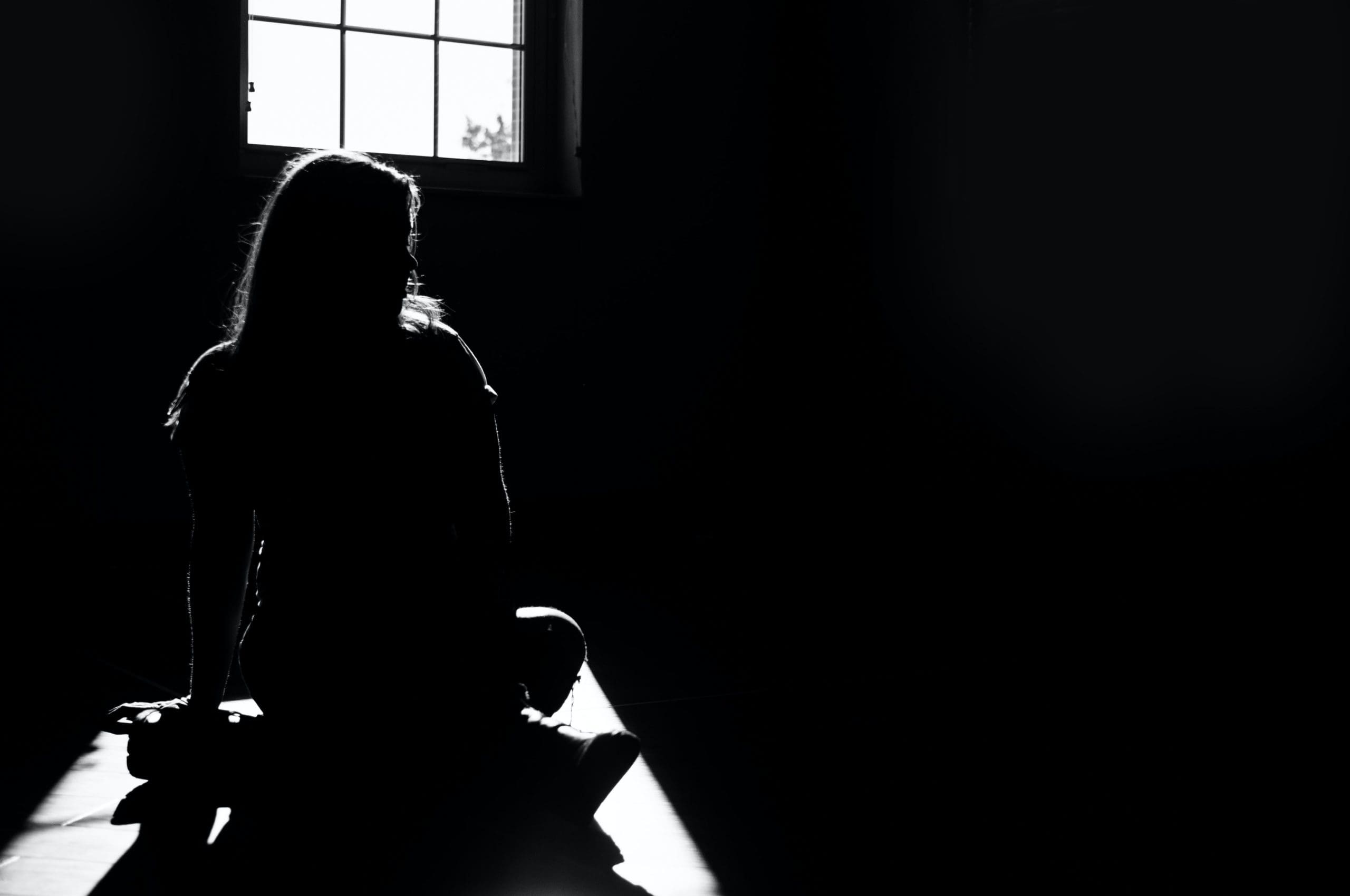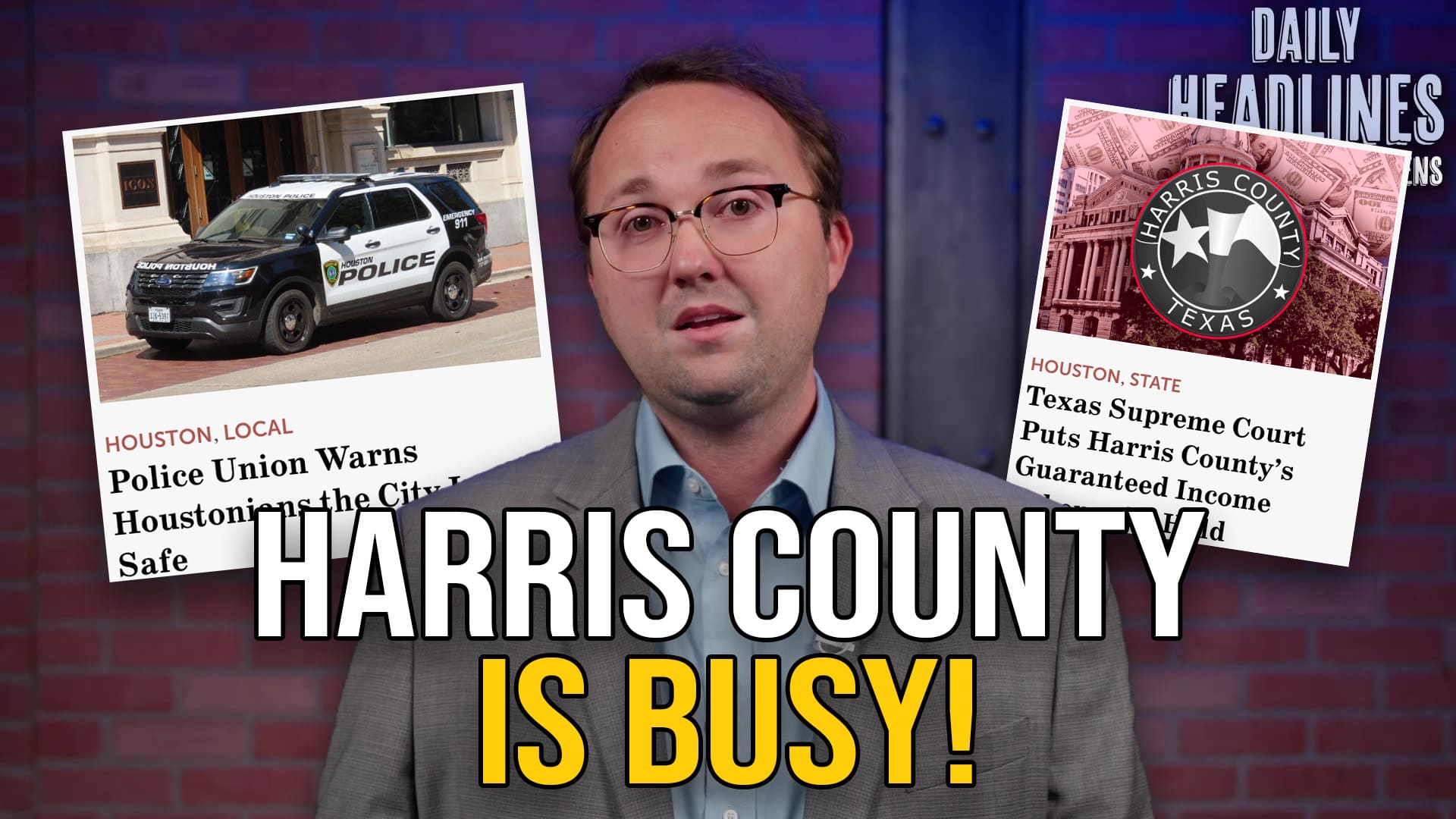Despite passing strong laws against the practice, specialists say sex slavery in Texas is worse than before.
The immoral trade is plaguing Texas and Texans.
Source Documents
Texas Scorecard reviewed records obtained from the Office of the Attorney General detailing the progress on this issue in both 2020 and 2022.
We also reviewed the City of Houston’s Anti-Trafficking Strategic Plan, a 2018 study from Polaris, and data from the National Human Trafficking Hotline.
This article contains highlights from these documents. Citizens wishing to conduct a deep dive should click the links above.
Worse Than Before
During the course of this investigative series, Texas Scorecard has examined the problem of sex slavery and the craters it leaves in victims’ souls. We also examined state public servants’ response to the problem since 2019, results according to their own data, and how Gov. Greg Abbott’s and local officials’ 2020 COVID-related restrictions and lockdowns hurt efforts against this immoral market. Abbott also chose to give state taxpayer-funded grants for fighting sex slavery to multiple organizations with woke ideologies.
Data we reviewed from 2019 and 2020 showed Texas was second only to California for the highest levels of sex slavery. What then is the situation today?
“We are not making a dent. The crime itself has annually exponentially grown. We have not made a dent in the country, never mind Texas,” said Jaco Booyens, a subject matter specialist. His ministry has been fighting the evil trade and trying to rescue its victims. “[Texas is the] No. 1 state in the United States for children sexually exploited in trafficking.”
Booyens then highlighted the two major hubs within Texas. “Houston ranks No. 1 in the nation and in the world frequently. … We oscillate between Dallas and the Houston area—The Woodlands in Houston area—as top-ranking cities in the United States for trafficking.” Quoting numbers from the Texas Attorney General’s Office, Booyens said there are 79,000 minors trapped in sex slavery with 350-500 minors sold for sex per night on the streets of Dallas.
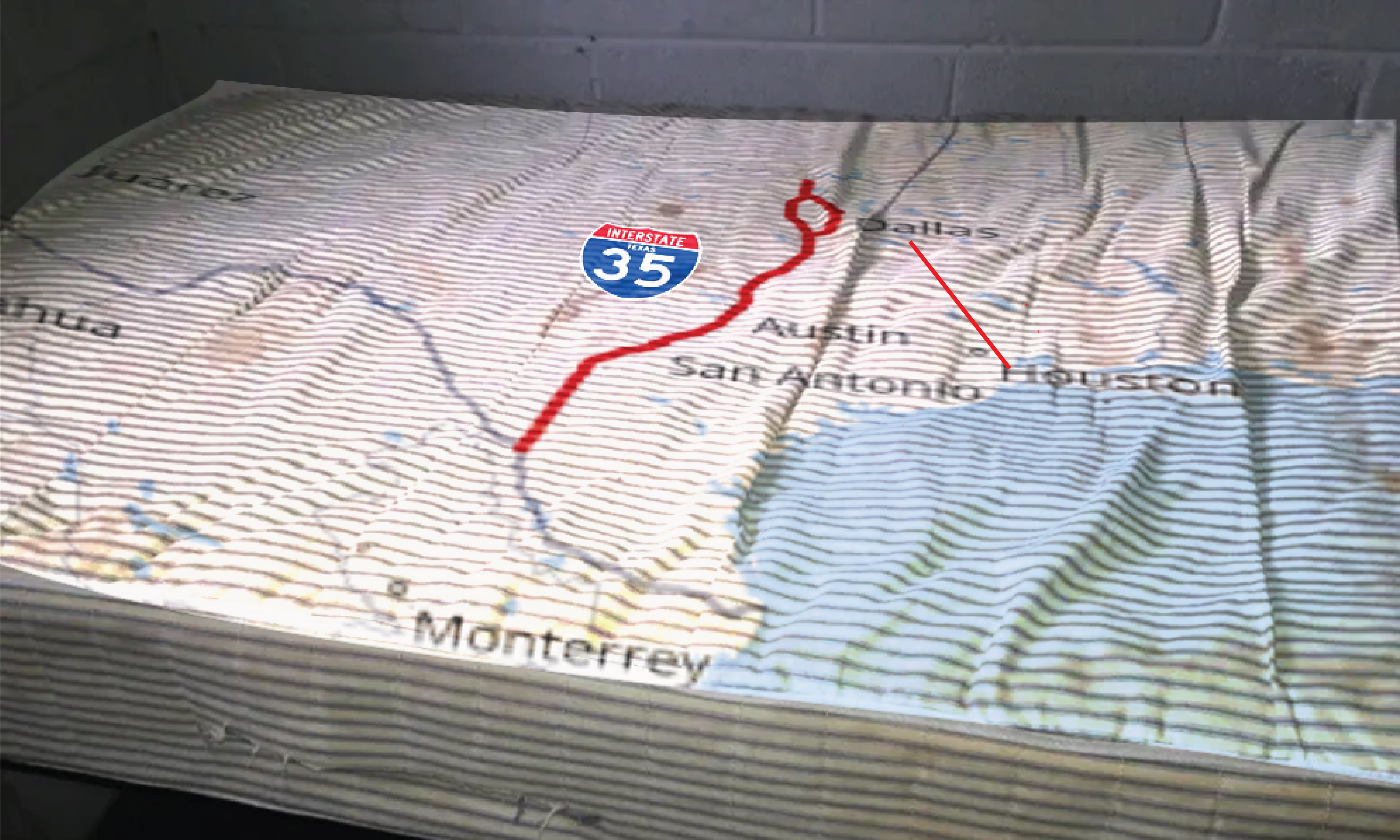
Dallas and Houston are reportedly two of the top areas for sex slavery in Texas.
Perhaps surprising to some, Booyens added that Texas’ open border is not the sole factor. “The amount of children that are trafficked across the border—migrant children—remove that conversation for [a] second,” he explained. “Naturally born American citizen children? Texas is No. 1 standalone without the border. Including the border? That’s not even a conversation.”
Selene Rodriguez, assistant director of federal affairs at the Texas Public Policy Foundation, agreed that sex slavery (also called sex trafficking) in Texas is worse than before. “The research that I have personally done is consistent with that,” she replied. However, she listed the open border as a significant factor, as well as staffing issues in law enforcement. “I will relate that significant increase … [to] the decrease in law enforcement professionals that we’re losing and the increase in illegal migration coming across our southern border.” She added young runaways (specifically teenagers), substance abuse, and homelessness as other factors.
Rodriguez further elaborated on the staffing problem. “We’ve spoken with people who are high up in these departments that are saying that once people are eligible to retire, they’re taking that as fast as they can. It used to be [that] they would stay on a little bit longer, or stay on as long as they could and put off retirement,” she said. “We’re going to continue to see an increase in human trafficking victims when we’re not enforcing the laws on the books, and we don’t have enough law enforcement to even try to begin to investigate these issues.”
We then asked her if Texas is now No. 1 for sex trafficking, as Jaco Booyens said. “I haven’t seen that exact number. I honestly wouldn’t doubt it, because we do take the bulk of that illegal immigration into the country,” Rodriguez replied. “It does sound really bad, and it is really bad, but California and Texas are also the largest states. With that, we’re going to have the highest number of a lot of things compared to states like Rhode Island and Maine.”
As far as the open border, Rodriguez said there was a connection between sex slavery and criminal drug cartels. It’s important to note that the U.S. government does not have operational control of the border area. She explained that the seven major Mexican drug cartels control what flows into our nation and state, and that they cartels orchestrate massive surges of illegal immigration at certain points in order to draw U.S. forces attention away from their real targets.
“With all of the parts in between the ports of entry that are unsecured, because all of our resources are pulled for the surge, they’re bringing in criminals, they’re bringing in children, they’re bringing in people that are being trafficked across and large amounts of drugs.”

There’s also a lack of transparency and accountability of what happens to children who’ve crossed the border. “We have a lot more research coming out about whistleblowers from Homeland Security and ORR [Office of Refugee Resettlement] coming out and saying, ‘hey, these kids are not going into safe situations,’” Rodriguez said. “There’s just been little to no accountability for these kids.”
Texas Scorecard asked Rodriguez if drugs coming across the open border are leading to the abuse of native-born Texans. “Drugs are certainly a huge factor that leads to increased abuse and trafficking,” she replied. “The significant increase in drugs coming across the border leads to a domino effect of other important issues.”
To date, Gov. Greg Abbott has refused to declare an invasion at the southern border, and deploy state assets to stop illegal border crossings.
Texas Scorecard reviewed data from multiple sources to see what story they tell about the changes in the sex slave trade in Texas. It is important to remember that sex slavery—or sex trafficking—is recorded as a subset of human trafficking. In 2019, the National Human Trafficking Hotline reported 1089 cases of human trafficking in Texas, 815 of which were identified as sex trafficking. In 2021, the hotline reported 917 cases, 661 of which were categorized as sex trafficking. Although this indicates a slight decrease, it does not tell us why. The hotline does not record how many instances of sex trafficking actually occurred, but rather how many instances were reported and classified as such.
The Texas attorney general’s 2022 report contains more information. It states that 2020 National Human Trafficking Hotline data identified 739 of the 987 human trafficking case reports as sex trafficking cases. It also cited 2021 data from the National Center for Missing and Exploited Children, which reported receiving more than 17,000 reports of possible sex trafficking. “Additionally, of the more than 25,000 cases of children reported missing to NCMEC in 2021, it is estimated that one in six of those who were deemed runaways were likely victims of sex trafficking,” the AG report states. “An estimated 19 percent of the children reported as runaways from the care of child welfare were likely victims of child trafficking.”
However, this report cautions about the data available. “One of the most challenging aspects of combating human trafficking in a state as large as Texas is collecting accurate data. Regardless of the reporting mechanism, if trafficking is not correctly identified, it is not being reported properly,” it states. “Crimes such as sexual assault of a child or harboring of migrant workers are easily identified by law enforcement officers immediately on the scene. However, it may not be until later in the investigation that those cases are correctly identified as human trafficking cases.”
The attorney general’s report explains that “when law enforcement officers or prosecutors list human trafficking as one of the offenses for arrest or charge, Texas is more able to fully capture the scope of trafficking within the state and better allocate resources to address this crime.”
As Booyens has noted, most victims of sex slavery do not self-report, so the complete size and scope of the sex slave trade in Texas is unknown.
Even when it comes to the prosecution of these crimes, the numbers may give an indication of whether the problem persists or not, but trends themselves do not explain the reason for their behavior. The chart below depicts the number of human trafficking cases filed in Texas across district and county courts for Fiscal Years 2018-2021. It is extrapolated from data acquired from the Texas Attorney General’s Office. These fluctuations do not speak to the actual progress of the fight against sex trafficking in Texas, but they do indicate that the work is far from over. It is also important to remember that suspects are innocent until proven guilty in a court of law.
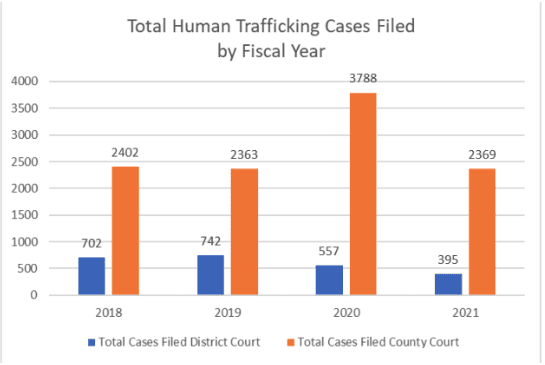
Extrapolated using data from Texas Attorney General’s Office.
Whether these cases are misrepresented, misclassified, or underreported, it is difficult to accurately determine whether the state of human trafficking in Texas has improved or whether it has fluctuated between the same abysmal levels that have been the status quo for the past decade.
Only one thing is certain: Texas has passed strong laws against sex slavery. “We have phenomenal laws, arguably the best laws on the books,” Jaco Booyens said, noting Texas is the only state in the union where buying sex is a felony.
What then is the problem? Why is sex slavery still so prominent? There’s a two-fold answer: it is a matter of culture, and a matter of public servants not doing their job. Texas Scorecard will examine the cultural part in the next article for this series. As for public servants, a Dallas citizen puts it best: “All the laws and bills in the world don’t really matter if no one’s here to enforce them.” Her name is withheld by request to protect her from retaliation. She has tried to raise awareness about a form of sex slavery in her city. For the duration of this article, she will be referred to as “Jane.”
Jaco and Rodriguez agree lack of enforcement is a major problem in Texas. “That’s a problem that we’re seeing,” Rodriguez said. “We have some great laws in place, but who’s making sure that these laws are being met?” She advised that these laws lack clarity about who’s accountable for enforcement. “The legislation, when it’s written, really needs to be specific about the agency that’s going to be responsible for that enforcement mechanism, and what their exact duties are.”
Jaco emphasized that passing laws alone is not the metric to use to measure progress. “We need to actually look at the numbers of children exploited … whether those cases actually make it into the court, and does a jury of their peers take the law that was written and give the guy 30 years behind bars,” he said. He said that Republican-controlled Collin and Tarrant Counties are taking the lead in this fight, while Democrat-dominated Dallas County, on the other hand, is “non-existent” on this issue. “[County Judge] Clay Jenkins, this is a non issue for him. The DA [John Creuzot] in Dallas won’t even take the case.”
Neither Jenkins nor Creuzot replied to Texas Scorecard’s request for comment before publication.
The problem is more than just Dallas, though. Booyens said that of the 254 counties across the state, only ten, including Tarrant and Collin, are seeking to enforce the law. “We have a disastrous problem with district attorneys in Texas not prosecuting these cases for what they are: child rape, child sex trafficking cases.” Instead, these cases get pled down to a misdemeanor, kidnapping, illegal firearms, or drugs charge. “[Attorney General Ken Paxton] has a hellacious fight on his hands to get district attorneys to prosecute the sex crimes against children.”
Statements about non-enforcement are consistent with Texas history, as covered in part one of this investigative series. As ABC 13 Houston investigative reporter Marvin Zindler told Texans, public servants had allowed the Chicken Ranch brothel to operate in “flagrant” violation of state law for more than a hundred years. The law was enforced only because its non-enforcement was brought to the light. In his interview with Letterman, Zindler said why he exposed it: “For law enforcement, for public officials, to allow it to operate because they have a badge to do it, I don’t think it’s right, and that’s the reason I did it.”
During the 2023 legislative session, multiple proposals were introduced to address lawless district attorneys—from the Senate and the House—in matters other than election integrity. One passed the Legislature and was sent to Gov. Greg Abbott for signature. This proposal, House Bill 17, empowers a resident to petition for removing a prosecuting attorney from office if he or she believes that attorney refuses “to prosecute specific criminal offenses under state law.”
This brings us back to “Jane” of Dallas, and a particular form of sex slavery others say is hidden in plain sight.
Hiding in Plain Sight
Jane said she moved to Dallas before the Chinese coronavirus situation, and lived downtown for two years. During her previous job, Jane said she learned through a friend about sex slavery hidden in plain sight; massage parlors on Harry Hines Boulevard she alleged were actually selling sex. “They would have a lineup of girls for you to choose from. You can choose a girl, and you pay about $100-$200, and you have sex with them,” said Jane.
Such suspicions have been discussed elsewhere. Several sources, including the City of Houston itself, noted that common fronts for sex slavery are illegal massage businesses (IMBs). In the city’s Anti-Trafficking Strategic Plan, they highlighted possible ordinance changes that could tighten regulations pertaining to the licensing of massage businesses and close illegal parlors that facilitate this enslavement.
In 2018, the Polaris Project, the data arm of the National Human Trafficking Hotline, published a report on these businesses and how they operate. They found that there are an “estimated 9,000-plus of these businesses … operating in every state in the country, with earnings totaling nearly $2.5 billion a year across the industry.” The trafficking that occurs in these settings are rarely under the guise of force; rather, traffickers use more subtle forms of manipulation and control that are less detectable but equally effective, insidious, and illegal.
The deception goes further, according to the Polaris report; many of these businesses are registered legally, so detecting illegal activities becomes that much harder. Laws in various municipalities in Texas surrounding business registration allow for the identities of business owners to be hidden, either by listing another agent as the owner, hiding behind a shell corporation, or leaving the field blank altogether. For example, Polaris examined the business records of 6,000 such IMBs. Their discovery? “Only 28 percent of these illicit massage businesses have an actual person listed on the business registration records at all.”
This web of anonymity makes prosecutions especially difficult to achieve, because the real owner is seldom found. Raids on the physical business often prove ineffective, because they tend to target slavery victims rather than the slavers themselves, since the owner is rarely on-site during business hours. Slavers also tend to rotate victims between locations in the network.
Although the activities of such businesses can be identified relatively easily online, identifying the responsible party and holding them accountable with criminal penalties is made increasingly difficult by these business loopholes. This is further complicated by the fact that human trafficking crimes are not isolated incidents; they are part of a wider network that includes other parlors as well as other kinds of businesses, and often include other telling crimes like money laundering.
Unfortunately, many legislative and law enforcement strategies do not place as heavy an emphasis on non-traditional ways to identify these criminals, such as through financial crimes. What is clear is that the current strategy is not working.
For Jane, fighting sex slavery is something should bring broad support. “I feel like this is the most bipartisan issue that could possibly exist, right? On the Republican side, this is a sense of freedom, and this is not what America stands for. If we want to take pride in this country, we have to fix these ugly, deep dark parts of it,” she said. “On the Democratic side, this is modern human slavery.”
Jane sought to try and verify for herself whether or not IMBs were in Dallas. Searching the internet, Jane alleged she found lists of hundreds of massage parlors in the city with telling reviews from men. She concluded from what she read that more than massages were being received. “[They] are exactly what you think they would be. Men saying, ‘Oh, I liked Michelle,’ for example. ‘She was a cute young, little Asian. Barely spoke English. She gave me the happiest ending,’” said Jane.
“I couldn’t believe it. I was like, no way this is real. Not in Dallas. Maybe in Las Vegas, but not in Dallas.”
Her investigation didn’t stop there. She switched from online research to walking the beat, making a list of massage parlors and going there in person. “I tried to schedule a massage. I didn’t ask any weird questions or anything out of the ordinary, and I genuinely did want a massage.” However, she claimed that once they saw she was a woman, she was never able to schedule an appointment.
Jane claimed she found more things she concluded were suspicious. “I go in and time after time, it was the same scenario. There’s two entrances. There’s heavy camera usage,” she alleged. “There’s no visibility from the street. When you walk into one of the first rooms, there’s like, usually a cage lock door to the second room, and someone peeks through a hole to see who you are and what you want. It was just incredibly shady.”
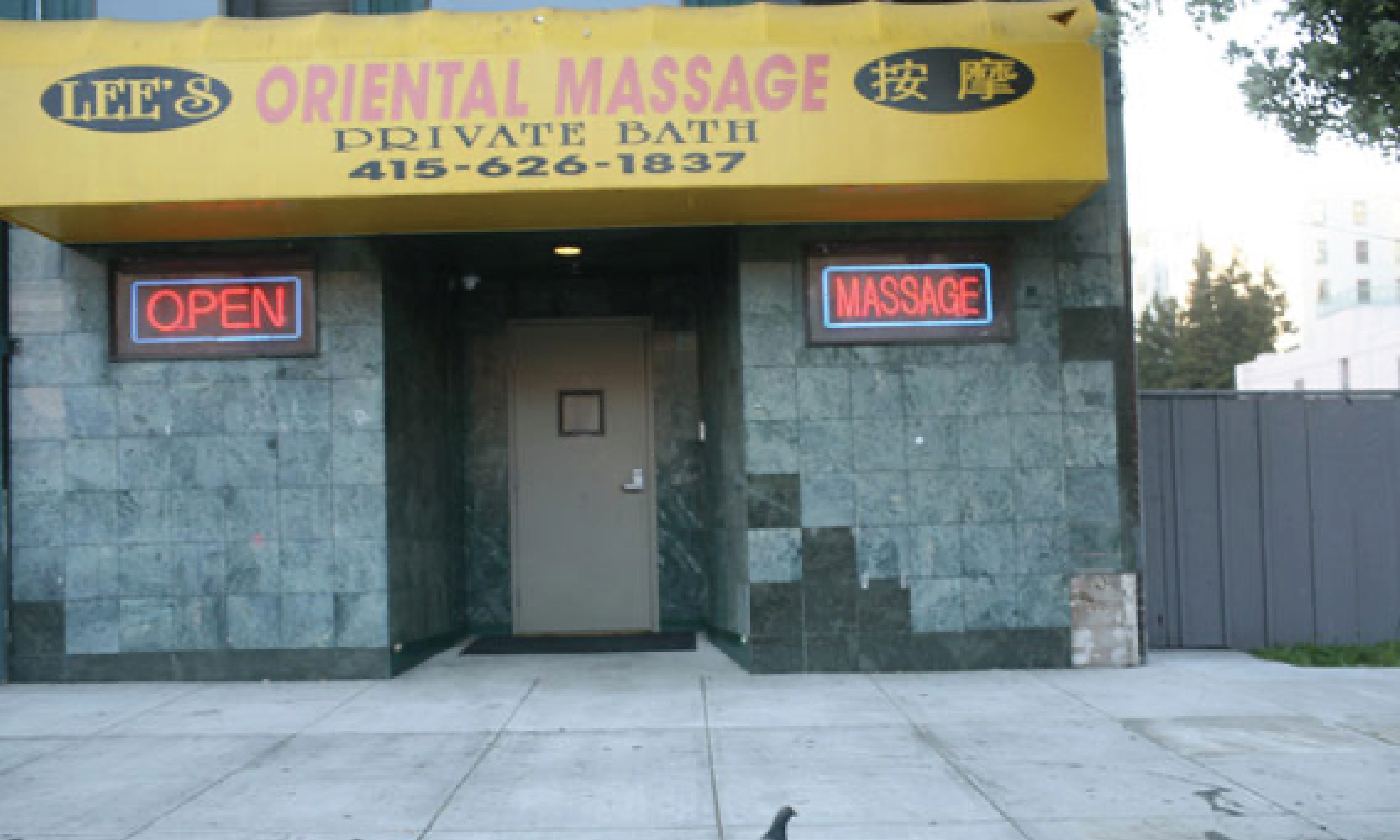
Critics believe heavily obscured massage parlors could be providing illicit services.
Texas Scorecard reviewed two recordings Jane took of herself trying to get a massage at two different massage business locations off of Harry Hines Boulevard in Dallas. She made these recordings on August 29, 2020. Both locations appeared to have obscured windows and gated doors within their lobbies.
At both locations, when she asked for a massage, she was told they had no openings. One employee said she didn’t know when they’d have an opening, wouldn’t give a price, and told Jane she had to make a reservation first. At the other location, an employee there said there wouldn’t be an opening for a week. When pressed for specifics, Jane was asked to call back the next day, and told a 40-minute massage cost $60.
Jane concluded that massages weren’t the only services being provided at these locations. As of May 2023, both locations are now closed. Texas Scorecard contacted the last known phone number of one of these businesses multiple times, but received no response before publication. An online search failed to provide contact information for the other.
Pressing Public Servants
After her experience, Jane sought change.
She researched what cities like San Jose, California, did to go after brothels posing as massage parlors. San Jose was the city where current Dallas Police Chief Eddie Garcia previously served as the top cop.
Based on her research, Jane believed a city permit was the answer—one that would require a background check on owners, as well as a copy of his or her bank statement and licenses for all employees. There would be no back entrances, no sexual advertisements, no locked or caged doors allowed. A log of clientele would have to be kept, and the inside of the establishment must be visible from the street outside. City code compliance, or any officer, must also have the ability to do complete wellness checks. The yearly fee for this permit would be $300, which Jane found to be the average amount nationwide for similar permits.
Jane strongly believes in the idea of the permit. “It’s worked in Aurora, Colorado. The problem is they moved to the city next door,” she said. “Eventually, there needs to be a statewide effort on how to minimize this. But until that time comes, there’s a lot we can do at the local level.”
“I completely agree with everything that she’s proposing,” Rodriguez told Texas Scorecard. But she prefers a more incremental approach, as opposed to a giant leap, because the lawmaking process is designed to kill new proposals. “You can’t take this big bite out of the elephant; you have to kind of start slow.”
Dallas City Council members apparently considered this idea at one point but didn’t follow through. “The problem is that Texas has a law that supersedes what cities can do to massage parlors,” Councilmember Cara Mendelsohn told CBS News on January 11, 2022.
During Texas Scorecard’s investigation for this series, we came across Section 455.005 of the Texas Occupations Code, which appears to prohibit local governments from imposing additional restrictions on massage therapists. It states: “A political subdivision may not adopt a regulation of the type described by subsection (b) that is more restrictive for massage therapists or massage establishments than for other health care professionals or establishments.”
We asked attorney Tony McDonald for his opinion. “The local ordinances are arguably partially or fully preempted by the state law,” he replied. “That said, that would have to be handled on a case-by-case basis and the preemption law has exceptions.” Selene Rodriguez agreed with McDonald’s assessment.
Texas Scorecard did find that the City of Laredo has a permit requirement for massage parlors, with restrictions similar to what Jane proposed. We asked Mayor Victor Trevino on the success of this requirement and if they have ever had interference from the state. “We are always vigilant when it comes to raising awareness and enforcement against sex trafficking, but Laredo is not seeing a rise or enforcing relevant ordinances,” he replied.
Where do matters stand today in Dallas? While a number of the locations Jane once visited are now closed, she alleges there are still massage parlors selling sex. “I can show you several places right now that are going to operate tonight and are going to be very busy.”
Texas Scorecard contacted Dallas Mayor Eric Johnson’s office on illicit massage parlors and his efforts to fight sex trafficking in the city. “I’d have to look further into the specific allegation you reference, but what I can tell you is that public safety is Mayor Johnson’s top priority, and that includes protecting victims of sex trafficking,” replied Maddy Madrazo, Johnson’s chief of policy and communications. “For your awareness, on February 13, the city’s Public Safety Committee received a briefing on the Dallas Police Department’s human trafficking enforcement initiatives. The briefing includes relevant data and highlights the diligent efforts of DPD’s Vice Unit and High-Risk Victims Trafficking Squad.”

Photo by Shreyas Shah via Unsplash
Texas Scorecard also asked the Texas Attorney General’s Office about the problem of illicit massage parlors. “Attorney General Paxton has been a nationwide leader in fighting human trafficking and recently filed two lawsuits to shut down illicit massage businesses in Montgomery County, Texas,” replied press secretary Jarrod Griffin. “The Office of the Attorney General also presides over the Texas Human Trafficking Prevention Task Force, which provided a number of recommendations to the Texas Legislature regarding legislative changes that would enhance the State’s ability to combat this crime.” Griffin provided a copy of these recommendations. He did not respond to a request for an update on the status of all these recommendations this session.
Attorney General Ken Paxton (R) provided a statement. “Doing everything possible to combat—and ultimately end—human trafficking is one of my top priorities in office. Tragically, the Biden’s Administration’s decision to open the U.S. border has directly aided human traffickers, particularly in their evil and unthinkable efforts to smuggle and take advantage of women and children,” he wrote. “My office continues to work relentlessly to bring to justice the vile criminals exploiting innocent victims in this way.”
He mentioned how in 2016 he created the Human Trafficking and Transnational/Organized Crime Division, that this helps law enforcement in solving and prosecuting human trafficking cases, and trains the public and elevates awareness of the problem. “I will continue to make stopping human trafficking and punishing those responsible for these heinous crimes a cornerstone of my work as Attorney General, and I call on every single prosecutor to do the same.”
According to a 2022 report from the Texas Attorney General’s Office, the OAG closed 17 illicit massage businesses along with 23 cases, amassing 212 years in prison sentences and one life sentence. The Texas Alcoholic Beverage Commission has also made progress. “Since 2019, TABC has successfully taken administrative action against 23 establishments for allegations of human trafficking. Nearly 50 percent of those establishments had their permits canceled and had reported over 40.5 million dollars in revenue.” According to the Texas AG’s 2020 report, the Texas Department of Licensing and Regulation worked with other members of law enforcement in an effort that “resulted in 9 arrests, including 1 arrest of an owner of multiple illicit massage locations, 1 illicit massage business being shut down by city officials during a joint sting operation, and has helped identify and secure the outcry of two trafficking survivors.”
The Ongoing Fight
When it comes to sex slavery, Texas has a history of passing good laws but not enforcing them. This is seen in sex slavery as well as other matters, such as the non-enforcement of the the Lone Star Infrastructure Protection Act. This was passed in response to a retired Chinese military general buying Texas land near a U.S. military installation, reportedly to conduct espionage.
Good laws targeting sex slavery continue to be proposed. In the 2023 legislative session, state lawmakers sent to Gov. Greg Abbott a proposed law that has several provisions to crack down on criminals who sexually exploit children. Rodriguez pointed out other proposals sent to Abbott for him to sign into law, including House Bill 279. She said this would allow prosecutors to try traffickers that have victimized disabled adults without requiring that they prove the elements of force, fraud, or coercion. This policy change would protect adults with disabilities who are especially vulnerable to trafficking.
But again, Jaco Booyens and Rodriguez say one of the key problems in Texas is that laws against sex slavery aren’t being enforced.
All the way back in 1973, Texas didn’t shut down the Chicken Ranch brothel until attention was brought to it.
Time will tell whether or not Texas’ public servants today will start enforcing the strong laws on the books on their own, or if they’ll need public pressure to remove Texas as the major hub for this horrendous slave trade.
In Part 4 of this series, Texas Scorecard will examine the culture war aspect of this fight, and why it must be won in order to defeat sex slavery.
This article was updated to reflect the passage of House Bill 17, which is intended to hold lawless prosecuting attorneys accountable.
